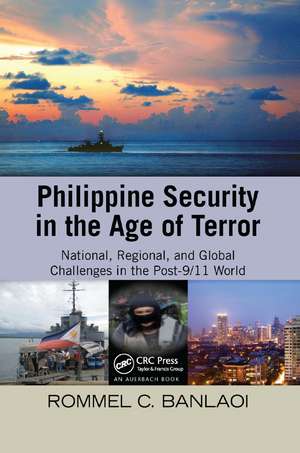Philippine Security in the Age of Terror: National, Regional, and Global Challenges in the Post-9/11 World
Autor Rommel Banlaoien Limba Engleză Paperback – 10 sep 2018
In Philippine Security in the Age of Terror: National, Regional, and Global Challenges in the Post-9/11 World, Banlaoi illustrates the increasing complexity of the issues. Divided into three sections, the book explores why a nation’s security can no longer be just about its military or only about what is happening within its borders.
- Section I reviews issues specific to the Philippine people, including politics, national identity, globalization, and local and military security.
- Section II moves to bilateral security issues to report on security interests and collaborations with the United States, China, and Australia—as well as with India, Japan, and Russia.
- Section III examines selected global, regional, and multilateral issues such as maritime security, piracy, and the ASEAN Regional Forum.
Preț: 357.74 lei
Preț vechi: 479.93 lei
-25% Nou
Puncte Express: 537
Preț estimativ în valută:
68.46€ • 71.21$ • 56.52£
68.46€ • 71.21$ • 56.52£
Carte tipărită la comandă
Livrare economică 14-28 aprilie
Preluare comenzi: 021 569.72.76
Specificații
ISBN-13: 9781138374201
ISBN-10: 1138374202
Pagini: 376
Ilustrații: 17
Dimensiuni: 156 x 234 mm
Greutate: 0.71 kg
Ediția:1
Editura: Taylor & Francis
Colecția Auerbach Publications
Locul publicării:Oxford, United Kingdom
ISBN-10: 1138374202
Pagini: 376
Ilustrații: 17
Dimensiuni: 156 x 234 mm
Greutate: 0.71 kg
Ediția:1
Editura: Taylor & Francis
Colecția Auerbach Publications
Locul publicării:Oxford, United Kingdom
Public țintă
Professional Practice & DevelopmentCuprins
NATIONAL SECURITY ISSUES. Identity Politics and Philippine National Security in the Age of Terror. Globalization and Nation-Building in the Philippines: State Predicaments in Managing Society in the Midst of Diversity after 9/11. "Radical Muslim Terrorism" in the Philippines. Local Government Response Against Terrorist Threats in the Philippines: Issues and Prospects. The Military and Democracy in the Philippines in the Age of Terror: Towards a Democratic Control of the Armed Forces of the Philippines. Security Sector Governance in the Philippines: A Policy Challenge in the Age of Terrorism. Philippine Elections and National Security after 9/11: Thinking Outside the Ballot Box?. BILATERAL SECURITY ISSUES. The Role of Philippine-American Relations in the Global Campaign against Terrorism: Implications for Regional Security. Philippines-China Defense and Military Cooperation: Problems and Prospects in the Post-9/11 Era. Broadening Philippine-Australia Defense Relations in the Post 9/11 Era: Issues and Prospects. GLOBAL, REGIONAL AND MULTILATERAL SECURITY ISSUES. Global Security Issues and Concerns after 9/11: Threats and Opportunities for the Philippines. Maritime Security Outlook for Southeast Asia in the Post 9/11 Era. Non-Traditional Security Issues in Southeast Asian Maritime Domain: Implications for the Indian Ocean. The ASEAN Regional Forum and Security Community Building in the Asia Pacific after 9/11: Lessons from European Integration. Security Cooperation and Conflict in Southeast Asia after 9/11: Constructivism, the ASEAN Way and the War on Terrorism. The Philippines and ASEAN at 40: Achievements, Challenges and Prospects in Regional Security Cooperation.
Notă biografică
Rommel Banlaoi is the Chairman of the Board and Executive Director of the Philippine Institute for Peace, Violence and Terrorism Research and Head of its Center for Intelligence and National Security Studies. He is also currently a Senior Fellow at the Yuchengco Center of De La Salle University, Manila where he heads its Regional Security and Foreign Relations program.
Recenzii
Clearly, Banlaoi is well-versed in Philippine security issues as evidenced by his description of the internal security challenges of the Philippines and institutional framework that has been established to deal with them. The extensively footnoted chapters on radical Muslim terrorism and local government responses to terrorist threats provide detailed descriptions of various Mindanao-based terrorist/insurgency groups and the government's strategy for dealing with them. … a useful starting point for developing a more rigorous analysis of the securitization process in the Philippines … .
—Contemporary Southeast Asia, Vol. 32, No. 2, August 2010
—Contemporary Southeast Asia, Vol. 32, No. 2, August 2010
Descriere
From national security and military issues to government response against terror threats, this handbook and policy guide illustrates the nuanced response of Filipino security policy to the deep historical, economic, social, and political roots of Muslim radicalism in the Philippines. Divided into three parts, this updated collection begins with Filipino-specific issues, including politics and national identity, globalization, and local and military security. Part Two covers bilateral security issues involving China, Australia, and the US, and Part Three concludes with selected global, regional, and multilateral issues such as maritime security, piracy, and the ASEAN Regional Forum.
